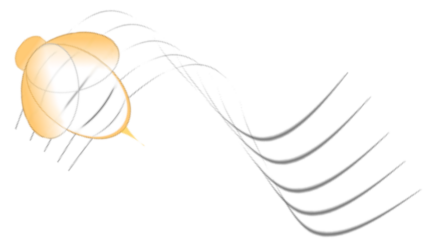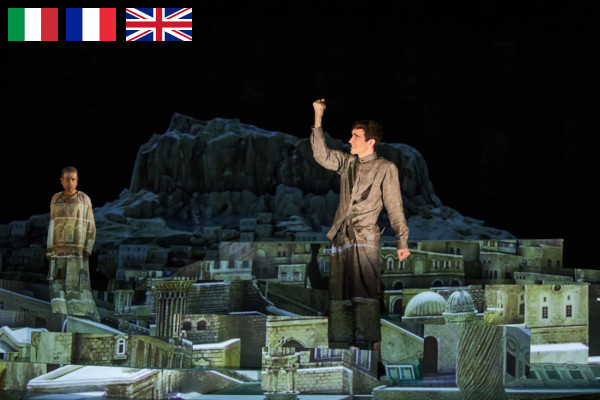Song of sorrow
by Suzanne Daumann
The world premiere of Alp Arslan by Richard van Schoor will not be easily forgotten. A great production for a great new opera it’s the song of the victims, a story about the spiral of violence and a search for love in an arid world.
Giessen, May 4th, 2019 - How often during a human life span do we get the privilege of witnessing a world premiere and partaking in its memorable triumph? Tonight, at the Stadttheater of the little town of Giessen in Germany, we had that privilege.
Richard van Schoor’s Alp Arslan, on a libretto by Willem Bruls, takes us to 12th century Aleppo and ends in the present; it’s the song of the victims, a story about the spiral of violence and a search for love in an arid world.
In the prologue, we hear the lament of the first victim: Loulou, the eunuch, sings the pain of his castration, and reminisces about his brother Achmad. He is buried in the desert sand, only his head is visible. Staging and light describe the heat, and the heat vibrates also in the music. Loulou’s singing goes from jarring to soft and announces the tragic destiny of the character.
Then the story unfolds: Sultan Ridwan is dying. His son Alp Arslan is present, feeling utterly alone and helpless, while the mothers of both Ridwan and Alp are singing laments about the sultan’s passing. The Sultan is dead and now Alp has to face the responsibility of defending Aleppo against the Franks - we are at the time of the crusades. Loulou is willing to help him, and declares his love, but Alp rejects his support and his avances, he hates the eunuch. Yet he knows that he needs him.
Alp has created a reign of terror. During an orthodox Easter mass, with entrancing choirs, his mother explains the situation to her cousin, the emir of Damascus. Loulou and Alp are circling each other, between attraction and repulsion - Loulou is still in love with Alp but is horrified by his methods, Alp is too lonely and in search of affection to resist - a sexual relationship begins, based on power instead of love. No, Alp is incapable of love. His mother explains that she has never been able to love him because she was raped by her husband when he was conceived.
The situation is becoming desperate, Aleppo is about to fall into the hands of the crusaders, but Alp refuses to begin negotiations. Loulou starts a fight for life and death with him, and Alp is killed. But now Loulou is too powerful and is killed in his turn.
In a moving epilogue, his spectre sings again his great pain, and we hear again about Achmad: one day of 2012, a Syrian soldier named Achmad was ordered by his officer to rape a woman. He refused and the officer shot him dead. We have come full circle and the spiral of violence goes on and on…
We held our breath while this story unfolded, so full of passion and passionately told. Richard van Schoor’s music is wide-ranging, and illustrates, underlines and sings every scene, each emotion just perfectly: jarring, discordant Sprechgesang tore at our heartstrings just as the emotions tore apart the characters, Syrian musicians played lovely chamber music, and if sounded like straight from Aleppo. The original Syrian music however was just one beautiful chorus, recorded by Willem Bruls in a church in Aleppo that has been destroyed since. This opera was no modern-day „Turquerie” however, the oriental music was carefully instilled and never came just by chance.
Willem Bruls’ libretto is based on an old legend and on a deep knowledge of Syria and Aleppo. His dialogues were terse, concise, troubling and dramatic and the music perfectly corresponded. We fervently hope to see other works by this amazing team.
A cast of wonderful singers did ample justice to this work:
Counter-tenor Denis Lakey took on the very demanding part of Loulou, moving as his character, oscillating between the deepest low notes and the screams of extreme pain, agile, troubling, moving. His adversary, Alp Arslan, was played by young tenor Daniel Arnaldos, full of passion and fire. With his clear young voice, he mastered the difficult score and the stage play between sex and solitude. Alto Rena Kleifeld sang the part of Alp’s grandmother. Her deep and moving voice perfectly translated the pain of a mother who loses her child. The tragical character of Alp’s mother, who cannot love her own child, was sung by mezzo-soprano Marie Seidler. She also was magnificent, with an entrancing voice that resonated the pain at the core of the her being. Barytone Tomi Wendt was the Emir of Damascus, and Tuncay Kurtoğlu was Ridwan, Alp’s father - another two wonderful voices and splendid interpretations.
Jan Hoffmann conducted the Philharmonic Orchestra of Giessen through the ambitious score.
Marc Jungreithmeier’s stage design was versatile as the music, with many video elements that were sometimes confusing, sometimes helpful. Monika Gora’s costumes defined the characters quite clearly, especially Alp, who was the only one to wear a Western suit.
It is rare to assist a world premiere, and it is also rare to be present at a production where everything comes together, from the libretto to the music, and from the set to the costumes - tonight everything came together for an evening that will not be easily forgotten.
Thanks to the town of Giessen and to everyone involved, bravi tutti and a long life and much success to Alp Arslan!
foto Rolf K. Wegst









